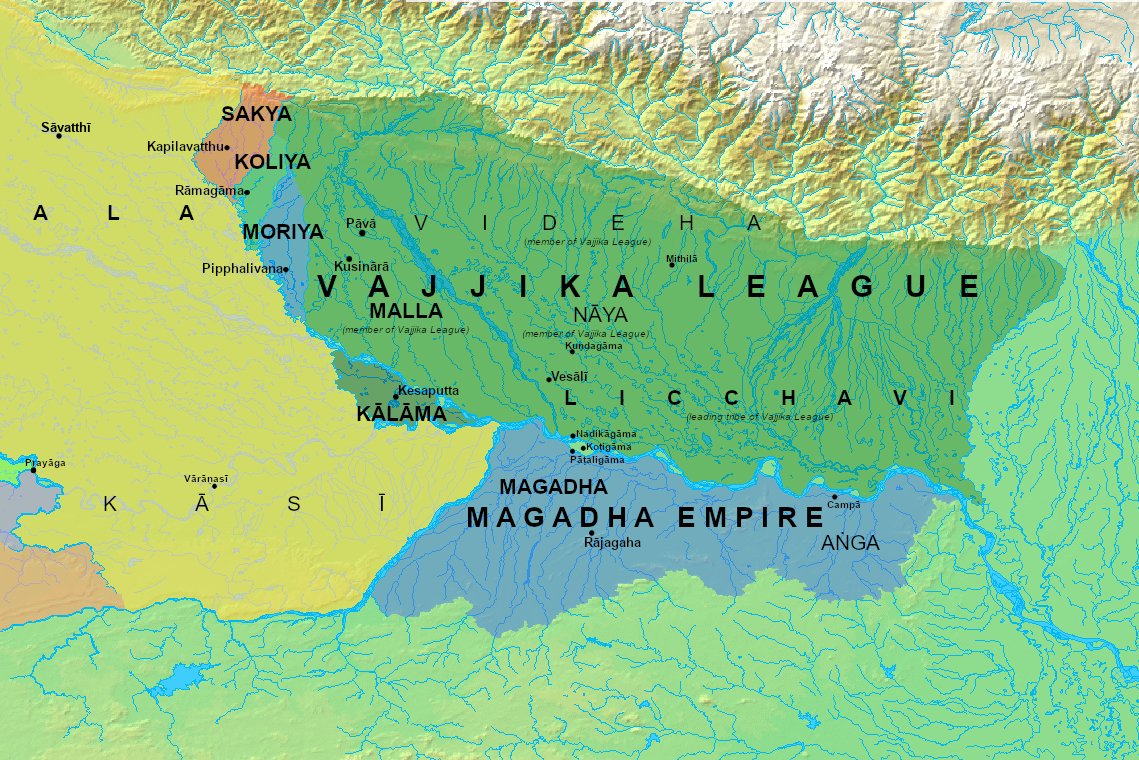“Surely we don’t want to tear ourselves apart each time we discover a disagreement… We have to find a different way of responding to things we disagree with, or that we find offensive, because I do think that humanity is at stake”
Bruce Gilley
The above quotation is the historian, Bruce Gilley, speaking in an interview on the YouTube channel Triggernometry.1 Most of the interview was taken up with the fact that he had written a book called The Case for Colonialism, which did not get published. Some people who were convinced that colonialism is a bad thing (and who did not want to hear, or allow anyone else to hear, a different point of view) had succeeded in pressuring his publisher to withdraw the book (with ‘serious and credible threats of personal violence’). I know next to nothing about colonialism, so I do not have an opinion on whether it was predominantly a good or bad thing. Still, I would have liked the freedom to read the book so that I could consider Gilley’s arguments.
This of course is just one instance among many in which a point of view disliked by some is ‘cancelled’: that is, effectively censored. The above quotation (the final thing Gilley says at the end of the interview) is a warning that, if we are unable to tolerate points of view with which we disagree or find abhorrent, or to engage in dialogue with the people who hold such views, it does not bode well for the future of our society.
Even when people of opposing views seem to be talking to each other, usually they are not. Typically, they tell their opponents what they think, sometimes citing facts and statistics, but do not listen to their opponents’ arguments. They are convinced of the truth of their own point of view, and strongly attached to it, which renders them unable or unwilling to listen to other opinions. What results is not thoughtful consideration, perhaps leading to the changing of minds or at least the modification of positions, but frustration, anger and hostility.
This is not an original observation of course. There are numerous studies by psychologists and social scientists on this topic. Recently James Lindsay and Peter Boghossian have published an excellent book, How to Have Impossible Conversations, based on many of those studies, including their own. But Buddhists seeking guidance on how to debate wisely have an older source ready to hand.
The Buddha lived at a time and place in which different religious and philosophical ideas were expounded and debated, and he occasionally spoke with people who disagreed with him. These disagreements were usually on topics we would now call religious. Sometimes they were on the topic of the caste system: a form of social and religious discrimination, not dissimilar to racism. Accounts of these disagreements have come down to us, and I think we can learn from them. In this article, I want to share with you some of the Buddha’s teachings on debate, and also describe how he himself debated.
The Buddha’s Teachings on Debate
The Buddha was well aware of the dangers and pitfalls of engaging in debates, and he had some interesting observations about how to conduct oneself in a discussion. There is an early set of sixteen suttas (discourses) from the Pali Canon called the Atthaka Vagga, of which seven are at least partially concerned with debates. In one of them, when talking about people who think that only their own religion is the true one, the Buddha says:
Insisting that what they depend on is good,
they are deeply entrenched in their personal truths.Seeking controversy, they plunge into an assembly,
regarding one another as fools.
Relying on others’ authority,
they speak in debate.
Desiring praise, they claim to be skilled.Engaged in disputes in the midst of the assembly,
— anxious, desiring praise —
the one defeated is
chagrined.
Shaken with criticism, he seeks for an opening.He whose doctrine is [judged as] demolished,
defeated, by those judging the issue:
He laments, he grieves — the inferior exponent.
“He beat me,” he mourns.These disputes have arisen among contemplatives.
In them are elation, dejection.
Seeing this, one should abstain from disputes,
for they have no other goal
than the gaining of praise.2
I expect you will recognize some of that. It seems that, when it came to debates, ‘contemplatives’ (wandering religious mendicants) in ancient India were pretty much the same as people today. What the Buddha was criticising was the motivation of the protagonists: they were not debating to find the truth, but to win. That kind of debate is an essentially egotistic enterprise. People may sincerely believe the opinions they hold, but their ego appropriates those opinions, so they become ‘deeply entrenched in their personal truths’. Once entrenched it is very hard to persuade them to look again at their conclusions and entertain the possibility that they could be wrong. Their sense of identity becomes dependent on their views, so it is important to them that they win. I have just been describing ‘other people’, but I could just as easily be describing myself, and probably you too! One of the hardest things to do in an argument is to hold fast to the desire to find the truth and to put aside your ego.
In a sutta in another part of the Canon, the Buddha describes the qualities that make one either ‘fit to talk with or unfit to talk with’. Summarising his teaching in verse, he says:
Those who discuss
when angered, dogmatic, arrogant,
following what’s not the noble ones’ way,
seeking to expose each other’s faults,
delight in each other’s misspoken word,
slip, stumble, defeat.
Noble ones
don’t speak in that way.
If wise people, knowing the right time,
want to speak,
then, words connected with justice,
following the ways of the noble ones:
That’s what the enlightened ones speak,
without anger or arrogance,
with a mind not boiling over,
without vehemence, without spite.
Without envy
they speak from right knowledge.
They would delight in what’s well-said
and not disparage what’s not.
They don’t study to find fault,
don’t grasp at little mistakes.
don’t put down, don’t crush,.
don’t speak random words.3
The Buddha’s words speak for themselves and need no commentary from me. Besides, for the rest of this essay we will be looking at how the Buddha actually debated contentious issues, which I think is more illuminating than what he says about such debates.
There are a number of suttas which describe discussions between the Buddha and those who held different views, usually people committed to other religious or philosophical traditions. Of course, we cannot be sure that these arguments actually happened, or if they did, that they happened in the way described in the suttas. My own view is that the arguments are based on real disagreements between the Buddha and others, but the suttas are probably stylised accounts of those disagreements, formulated for the purpose of educating the Buddha’s disciples. However that may be, we can learn a lot from the way the Buddha conducts arguments in those accounts.
Throughout the rest of this essay I will use the pronouns he, him and his, because I haven’t yet encountered a text in which the Buddha debated with a woman. I haven’t read the whole of the Pali Canon, so it’s possible that such texts exist, but if they do I don’t know them, so all of the accounts I will draw on in this article are of debates with men. According to the ancient commentaries on the suttas, there were female debaters in India at the time of the Buddha though. One of them, Bhaddā-Kundalakesā, was what we might call a professional debater, and she was apparently very good at it. She would enter a village and, making a heap of sand at the gate, set up the branch of a rose apple tree and announce: “Whoever wishes to enter into discussion with me, let him trample on this bough.” One day Sariputta, one of the Buddha’s disciples, famous for his wisdom, trampled on the bough, and ‘won’ the subsequent debate. Bhaddā-Kundalakesā then became a disciple of the Buddha, and for the rest of her life used her fine intellect to teach the Dharma.
The Buddha in Debate
When it became clear in a conversation that he disagreed with his interlocutor, the Buddha would often say:
As long as you’ll speak on the basis of truth, we might have some conversation about this.
The first thing to notice is that the Buddha invites his interlocutor to have a discussion (‘We might have some conversation…’). It is a friendly gesture, and he remains friendly and courteous throughout. Secondly, the Buddha sets a condition: he is prepared to have a conversation as long as his interlocutor bases his responses on the truth, or at least what he considers to be the truth. There would be no point in talking to anybody who was not willing to be truthful. Or, to put it in the Buddha’s words, such a person would be ‘unfit to talk with’.
If his interlocutor was willing to do this, the Buddha would then proceed to ask him questions. After answering a few of these questions the interlocutor would sometimes say something that contradicted one of his previous statements, and the Buddha would point that out:
Think about it! You should think before answering. What you said before and what you said after don’t match up. But you said that you would speak on the basis of truth.
This reveals a third important point. The Buddha not only valued truth, but recognised that reason is an indispensable tool when debating truth. Reason requires consistency and coherence: an argument has to ‘add up’. Internal contradictions are evidence that an argument is incoherent, and therefore is not securely founded in truth. If an interlocutor could see and admit that, he might learn something valuable. By honestly facing the incoherence in our arguments, we can clarify them, or modify them, or if necessary, abandon them altogether.
One of the conversations in which this happens involves a man called Upāli, a disciple of another teacher. When the Buddha points out a contradiction in Upali’s argument, Upāli simply states his position again. The Buddha does not press him, but proceeds to ask another series of questions, during which he points out contradictions in Upāli’s argument another three times. Each time, Upāli simply repeats his position. However, on the fifth occasion Upāli gives in, saying, ‘Sir, I was already delighted and satisfied by the Buddha’s very first simile. Nevertheless, I wanted to hear the Buddha’s various solutions to the problem, so I thought I’d oppose you in this way.’4 This is a great example of someone being more interested in finding the truth than in being right. You may think this is unlikely: who would enjoy getting trounced in an argument? It is worth bearing in mind that Upāli had been put up to this debate by his teacher. We can surmise that his heart was not really in the task. Consequently, he was not very attached to the outcome, which allowed him to enjoy the Buddha’s skill in debate.
This reminds me of something that Lindsay and Boghossian write in their book How to Have Impossible Conversations: the best you can hope for in debates is to give your interlocutors ‘the gift of doubt’. If they are sincere in their pursuit of the truth, then they will think it over later, and perhaps eventually change their minds. If, however, you try to press home your advantage, they are likely to double down on their position, and all the work that you have done to produce that state of doubt will be lost. ‘A man convinced against his will, is of the same opinion still,’ as the old adage goes. And the conversation will probably end in a bad-tempered and hostile manner. Having said that, the Buddha did not always leave his interlocutor with an unacknowledged contradiction; sometimes he did press home his point.
The Importance of Being Honest
Not everyone responded as Upāli did when the Buddha pointed out the contradictions in their arguments. Saccaka was ‘a debater, a sophist, well-regarded by people at large’. He approached the Buddha with the express purpose of beating him in debate. He brought with him an audience of five hundred to watch him triumph. The discourse begins with Saccaka asking the Buddha a question, which he answers, and then invites Saccaka to put his own point of view. The Buddha then asks a question, to which Saccaka replies, adding that the ‘great crowd’ who have accompanied him also think the same. The Buddha has no interest in this:
What does this great multitude have to do with you? Please focus just on your own assertion.5
Whether other people agree with Saccaka or not is irrelevant; his argument stands or falls on its own merits. The Buddha is not impressed by groupthink. Instead, he asks a question which Saccaka is unable to answer without contradicting himself. Saccaka therefore says nothing. The Buddha repeats the question. Again, Saccaka is silent. The Buddha then says something rather shocking: he tells Saccaka that he should speak, declaring, ‘This is not the time for silence.’ And he warns Saccaka:
When anyone doesn’t answer when asked a legitimate question by the Tathāgata up to three times, his head splits into seven pieces right here.
Now at that time the spirit Vajirapāṇi, taking up a burning iron thunderbolt, blazing and glowing, stood in the sky above Saccaka, thinking, “If this Saccaka doesn’t answer when asked a third time, I’ll blow his head into seven pieces there and then!” And both the Buddha and Saccaka could see Vajirapāṇi.
What can this mean? Perhaps Vajirapani’s threat symbolises the damage Saccaka is going to do to his integrity if he refuses to answer the Buddha’s legitimate question. Saccaka means ‘Truthful One’, but by refusing to answer the question he is desperately trying to prevent a truth being revealed: the fact that his argument is incoherent. This will ‘shatter’ his integrity. And although he will try to ignore the fact that he is being deceitful, the better part of him knows what he is doing. As does the Buddha, who urges him to speak: they can both ‘see’ Vajirapani. They both know that Saccaka is about to harm himself.
What can we take from this story that will allow us to have more productive debates? The person we should focus on is not the Buddha, who we should probably not emulate in this case, but Saccaka. Like Saccaka, we probably find it tempting, when an opponent is exposing the flaws in our argument, to try to escape: to change the subject, ignore the question, give a shallow, evasive answer, or resort to some other dishonest trick. But if we do any of those things, we are evading the truth. We are missing an opportunity to see where the weaknesses of our argument lie. Although such evasion may get us out of an embarrassing spot, it is really letting ourselves, and the truth, down. We should ask ourselves, ‘Am I debating to find the truth, or to win the argument?’
Debating with a Fundamentalist
It was well known to his contemporaries that the Buddha opposed the caste system, and there are many accounts of him debating the topic of caste with brahmins (who considered their own caste to be superior to others). I’m going to look at just one debate, with a young brahmin student called Assalāyana. 6 This student was travelling with a large number of other brahmins, and they happened to stay near where the Buddha was staying. They knew that the Buddha taught that people from all four castes (roughly speaking: priest, warrior, trader, and labourer) were equally able to become ‘purified’: that is, Enlightened. The brahmins wanted to take the opportunity to debate this with him. They asked Assalāyana to lead the charge because he was a very talented scholar, who they thought capable of beating the Buddha in debate.
Assalāyana was extremely reluctant to challenge the Buddha, of whose formidable reputation as a debater he was well aware. However, eventually they prevailed on him to do so, and he and all his fellow brahmins approached the Buddha, and ‘on arrival, exchanged courteous greetings with him.’ By the way, such polite exchanges did not happen every time someone wished to speak with the Buddha: some visitors were quite rude (as we will see in Part Two of this essay). Courtesy is important because when people holding opposing views meet, there is often an atmosphere of personal animosity, which adversely affects the conversation. When opponents are courteous towards one another, they are more likely to see the other as a collaborator in the search for truth, rather than as an adversary.
Assalāyana lays out his case immediately:
Master Gotama, the brahmins say: ‘Only brahmins are the highest caste; other castes are inferior. Only brahmins are the light caste; other castes are dark. Only brahmins are purified, not others. Only brahmins are Brahmā’s rightful sons, born of his mouth, born of Brahmā, created by Brahmā, heirs of Brahmā.’ What do you say about this?
The Buddha responds with a number of reasoned arguments, which taken together show Assalāyana’s belief to be irrational and therefore wrong. The first of these arguments the Buddha simply states, but from there onwards he asks questions, which Assalāyana answers. Each question develops the Buddha’s case a little further. Here is an example:
‘What do you think, Assalāyana? Is only a brahmin capable of taking some bathing paste of powdered shell, going to the river, and washing off dust and dirt, and not an aristocrat, merchant, or worker?’
‘No, Master Gotama. All four castes are capable of doing this.’‘Then what is the source of the brahmins’ self-confidence and forcefulness in this matter that they make this claim?’‘
Even though you say this, still the brahmins maintain their belief.’
The fact that all four castes are able to wash themselves in the river does not, on its own, disprove the brahmins claim of superiority, so Assalāyana’s last statement is not irrational. He could have replied that the Buddha’s question was a superficial one, in that the brahmins’ superiority does not depend on their ability to wash themselves. But by the end of the dialogue, Assalāyana has had to admit that the brahmins are not superior in any way, whether physically, ethically, or spiritually.
But the Buddha has many more questions, of which two seem to me especially penetrating. In the first, the Buddha asks Assalāyana if he has heard that in certain countries, namely Yona and Kamboja (probably references to Greece and Persia), there exist just two ‘castes’, masters and bonded servants, and that it is possible there for the master to become the servant, and vice versa. Assalāyana admits he has heard this. The implication is that the position of the brahmins is merely a social convention, not part of a fixed natural or supernatural order. That being the case, on what basis can he claim that brahmins are the superior caste?
In the second penetrating question, the Buddha asks whether brahmins are able to develop a mind of benevolence towards all beings, while the other three castes are unable to do so. Assalāyana replies that people from all four castes can cultivate benevolence in the same way. So, again, asks the Buddha, on what basis can he claim that brahmins are superior?
Probably none of the facts that Assalāyana has conceded, taken singly, disproves the claim that brahmins are superior to the other castes, but taken together they reveal so many points of inconsistency that the claim cannot stand. The Buddha puts it to Assalāyana that he has in fact admitted, in his answers, that all four castes have the potential to gain Enlightenment. At this, ‘Assalāyana sat silent, embarrassed, shoulders drooping, downcast, depressed, with nothing to say.’ He had ‘lost’ the argument, as he thought he would, and it was not his fault; his brahmin friends had put him in this position.
The technique of argument that the Buddha uses in his dialogue with Assalāyana is powerful but not coercive. He does not overwhelm his interlocutor with unfamiliar facts or novel concepts. He simply elicits from Assalāyana an admission of truths he already knows — things, indeed, that were probably common knowledge. Anybody can perform the rituals the brahmins perform; anybody can develop a more benevolent attitude of mind if they choose; different nations have different social structures, which do not always include a hereditary priestly caste. By a process of questioning, the Buddha leads Assalāyana to recognise that belief in the intrinsic superiority of brahmins is without any visible means of support.
Footnotes
- https://www.youtube.com/watch?v=pmo7M3Huz9I
- Pasura Sutta, Sutta Nipata 4.8. Translation: Thanissaro
- Kathavatthu Sutta (Discourse on Controversial Points) AN 3.67. Translation: Thanissaro
- Upāli sutta, MN 56. Translation: Bhikkhu Sujato
- Cula-Saccaka Sutta, MN 35, Translation Thanissaro. https://www.accesstoinsight.org/tipitaka/mn/mn.035.than.html
- Bhikkhu Sujato



